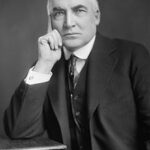President Warren G. Harding signed the Budget and Accounting Act on June 10, 1921. This landmark legislation created the Bureau of the Budget within the Treasury Department. The act revolutionized federal financial management through systematic oversight.
The Decision Behind Budget Reform
Before 1921, federal agencies submitted spending requests directly to Congress. No central coordination existed for government expenditures. Department heads operated independently without fiscal oversight. This fragmented system led to wasteful spending and budget chaos. 📊 Federal expenditures had exploded during World War I from $713 million to over $18 billion.
Establishing the Bureau of the Budget System
The new Bureau of the Budget centralized all federal spending requests. Charles G. Dawes became the first Budget Director under presidential appointment. The bureau required agencies to justify every expenditure through detailed proposals. 💰 This systematic approach promised significant cost savings for taxpayers. The reform also created the General Accounting Office for independent auditing.
Administrative Revolution in Government
Harding’s budget reform represented the first comprehensive federal financial overhaul. The system brought business-like efficiency to government operations. ⚠️ Previous administrations had operated without coordinated fiscal planning for decades.
Impact:
The Bureau of the Budget creation transformed American governance permanently. Within two years, federal spending dropped from $6.4 billion to $3.3 billion. 📉 This dramatic reduction helped balance the federal budget by 1923. The reform established presidential control over executive branch spending for the first time.
Long-term Constitutional Significance
The bureau strengthened executive power in fiscal matters considerably. Presidents gained unprecedented authority over federal budget priorities. This shift altered the constitutional balance between Congress and the executive branch. The reform created modern presidential budget-making responsibilities that continue today. 🌍 International observers praised America’s systematic approach to government finance.
Foundation of Modern Fiscal Management
The Bureau of the Budget evolved into today’s Office of Management and Budget. Every subsequent president has relied on this centralized budget system. The reform established permanent fiscal discipline within federal operations. 💰 Taxpayers benefited from reduced government waste and improved spending accountability. Congressional oversight became more focused through systematic budget presentations.
Enduring Historical Legacy
Historians consistently rank this among Harding’s most successful domestic achievements. The reform survived numerous political changes and administrative reorganizations. Modern federal budget processes still follow the 1921 framework fundamentally. 📊 The system proved essential during the Great Depression and World War II. This administrative innovation demonstrated how structural reforms could improve government effectiveness permanently.
